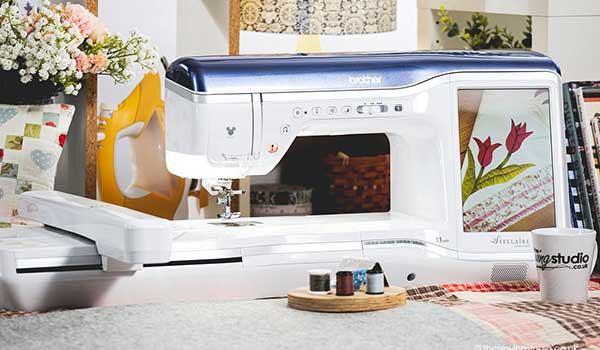Introduction
Picture this: You’ve captured the perfect moment in a photograph and imagined it beautifully embroidered on fabric. But your Husqvarna machine only reads VP3 files, leaving you wondering how to bridge the gap between digital image and stitched masterpiece. The good news? Convert JPG image to VP3 format is more accessible than ever, whether you’re a beginner or seasoned embroiderer.
In this comprehensive guide, we’ll explore:
- 3 reliable conversion methods (including a free option)
- How to prepare images for optimal digitizing
- Professional settings for different fabric types
- Troubleshooting common conversion issues
- Recommended software for various skill levels
By the end, you’ll be equipped to transform any JPG into a Husqvarna-ready VP3 file with confidence.
Understanding VP3 Files
Before converting, it’s important to know why VP3 matters for Husqvarna machines:
✔ Machine-Specific Optimization – Designed for Husqvarna/Viking embroidery systems
✔ Full Feature Support – Preserves all design elements and settings
✔ Editing Flexibility – Allows adjustments in Husqvarna software
✔ Reliable Performance – Fewer errors than generic formats
Method 1: Using Husqvarna’s Premier+ Software (Professional Results)
Best For: Serious embroiderers and small businesses
Step-by-Step Conversion:
- Image Preparation
- Open in photo editing software
- Convert to grayscale
- Increase contrast by 20-30%
- Crop to focus area
- Import & Digitize
- Launch Premier+
- Select “New Design from Image“
- Use auto-digitize with VP3 presets
- Manual Refinements
- Adjust stitch directions
- Set density (0.35-0.45mm typical)
- Add underlay stitches
- Export & Test
- Save as VP3
- Stitch sample on scrap fabric
Pros:
✅ Official software with perfect compatibility
✅ Advanced editing capabilities
✅ Realistic stitch simulation
Cons:
❌ Expensive investment
❌ Steep learning curve
Method 2: Online Converters (Quick & Free)
Best For: Occasional conversions
Recommended Tools:
- MyPhotoStitch.com
- OnlineEmbroidery.com
- EmbroideryConversion.com
Conversion Process:
- Upload JPG (under 5MB)
- Select VP3 as output
- Choose thread colors
- Download converted file
Advantages:
✅ No software installation
✅ Processes in under 3 minutes
✅ Good for simple designs
Limitations:
❌ Watermarks on free versions
❌ Limited control over settings
Method 3: Ink/Stitch (Free Open-Source Option)
Best For: Tech-savvy users
Requirements:
- Inkscape (free vector software)
- Ink/Stitch extension
Workflow:
- Vectorize image in Inkscape
- Apply stitch parameters
- Set stitch types and directions
- Export as VP3
Why It’s Great:
✅ Completely free
✅ Full manual control
✅ No watermarks
Challenges:
❌ Requires vector software knowledge
❌ Time-consuming for complex designs
Image Preparation Secrets
Professional digitizers spend more time preparing images than converting them:
For Photos:
- Resolution: Minimum 300dpi
- Ideal Size: 1000×1000 pixels
- Editing:
- Convert to black & white first
- Apply “Posterize” effect (3-5 levels)
- Sharpen slightly
For Logos/Graphics:
- Clean edges with vector tools
- Simplify small details
- Ensure closed shapes
Pro Tip: Use the “Squint Test” – if you can recognize the image while squinting, it’ll convert well.
Professional Settings Guide
Use these starting points for different fabrics:
| Fabric Type | Stitch Density | Underlay | Pull Comp |
|---|---|---|---|
| Cotton | 0.4mm | Zigzag + Edge | 1.0mm |
| Knit | 0.35mm | Double Zigzag | 1.2mm |
| Denim | 0.45mm | Contour Fill | 1.5mm |
| Silk | 0.3mm | Light Edge | 0.8mm |
Troubleshooting Common Issues
Problem: Blurry Details
Solution:
- Start with higher resolution
- Manually redraw key elements
- Increase density in detailed areas
Problem: Thread Breaks
Solution:
- Reduce density by 0.05mm
- Use quality thread
- Check needle size
Problem: Fabric Puckering
Solution:
- Add more underlay
- Use appropriate stabilizer
- Adjust tension
Choosing Your Conversion Method
For Beginners:
Start with online converters or SewArt trial
For Intermediate Users:
Try Embrilliance Essentials
For Professionals:
Invest in Husqvarna Premier+
Free Resources to Improve
- Husqvarna Viking Tutorials (Official YouTube channel)
- Embroidery Forums (PatternReview.com)
- Practice Files (Free VP3 designs to study)
Conclusion
Converting JPG to VP3 format unlocks your Husqvarna machine’s full creative potential. While the official Premier+ software delivers the best results, free alternatives like online converters and Ink/Stitch provide excellent starting points.
Remember these key tips:
✔ Always prepare images before converting
✔ Start with simple designs to build skills
✔ Test every file before final projects
What will you create first? Share your VP3 conversion experiences below!

















